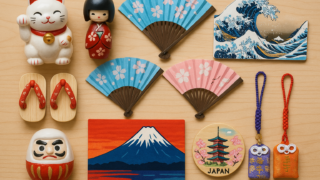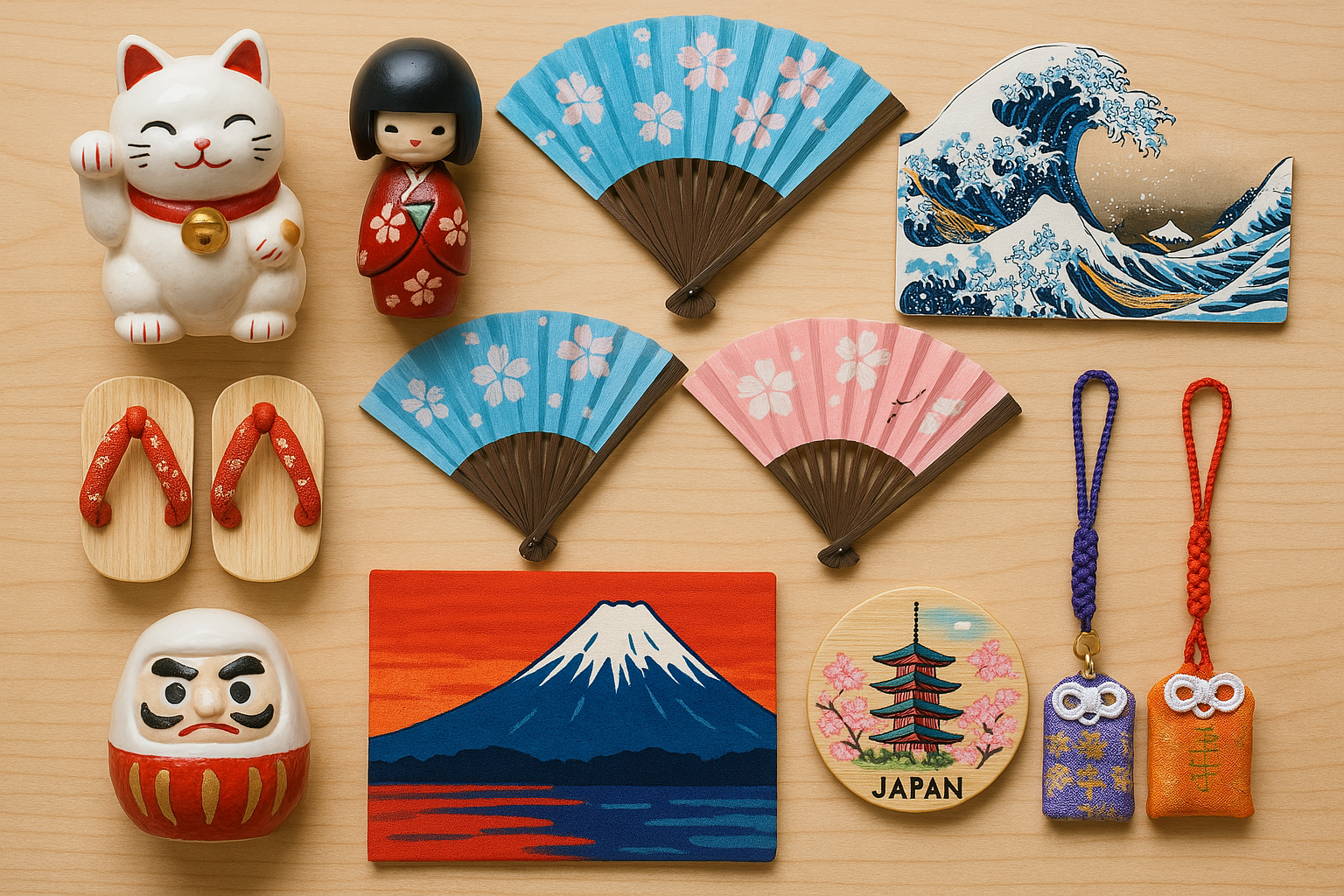How to Choose the Perfect Japanese Cultural Souvenirs: Your Ultimate Guide to Authentic Japanese Keepsakes!
- Understanding Japanese Souvenirs: A Blend of Tradition and Modernity
- What to Look for When Choosing Japanese Souvenirs
- Popular Japanese Cultural Souvenirs
- Where to Find the Best Japanese Souvenirs
- Budget-Friendly Japanese Souvenirs
- How to Pack and Transport Your Souvenirs Safely
- Conclusion: Take a Piece of Japan Home with You
Understanding Japanese Souvenirs: A Blend of Tradition and Modernity
When you think of Japan, what comes to mind? Maybe it’s the neon lights of Shibuya, or the tranquil beauty of Kyoto’s temples. But one thing is for sure: Japan offers some of the most unique and meaningful souvenirs you can take home. These keepsakes are not just trinkets—they are a piece of Japan’s rich culture, whether it’s a centuries-old craft or a modern twist on a traditional item.
I remember my first time shopping for souvenirs in Japan, and I was overwhelmed by the choices! The key is to look beyond the kitschy souvenirs and focus on items that tell a story. When choosing a souvenir, think about the culture and craftsmanship behind it—these items often carry centuries of history. From hand-painted pottery to delicious matcha treats, Japanese souvenirs are a beautiful mix of tradition and innovation that offer something for every traveler.
The Essence of Japanese Souvenirs
Japanese souvenirs aren’t just gifts, they’re memories. Each item has a connection to the place it comes from. For instance, in Kyoto, you might find beautiful kimonos or wooden fans, while in Tokyo, you’ll see modern, trendy items that still capture the essence of Japan’s rich history. It’s like picking up a tiny slice of the culture you just visited!
Think of it this way: buying a souvenir in Japan is like bringing home a little piece of Japan’s soul. Whether it’s a delicate piece of handcrafted pottery or a tasty treat like matcha-flavored sweets, the meaning behind these items runs deep. Each souvenir is a way to connect with Japan long after you’ve returned home.
Traditional vs. Modern Souvenirs
Let’s face it—sometimes, it’s tempting to grab a Hello Kitty keychain or a plush samurai doll as a quick souvenir. But if you’re looking to take home something that truly reflects Japan’s culture, consider a balance between traditional and modern items. Traditional souvenirs, like handcrafted pottery or calligraphy brushes, hold centuries of history and craftsmanship. These items often tell a story and are made with a great deal of skill and passion. Modern souvenirs, on the other hand, may blend the old with the new, offering quirky items that still capture the essence of Japanese culture. Think stylish Tokyo-themed tote bags or beautifully packaged teas.
As someone who once fell into the trap of grabbing cheap souvenirs, I can say this: it’s the traditional and thoughtfully crafted items that often end up being the most meaningful—and they make for great conversation pieces when friends visit.
What to Look for When Choosing Japanese Souvenirs
So, how do you choose the perfect souvenir? Here are a few tips to make sure you bring home something special and meaningful, rather than just another trinket.
Authenticity: A Key Consideration
When shopping for souvenirs in Japan, one thing is clear: authenticity matters. Many souvenirs are mass-produced, but the ones that truly reflect Japanese culture are those that are handmade by artisans who pass down their craft through generations. For example, the pottery you find in Kyoto’s shops is often made by local artisans who follow centuries-old traditions.
If you’re unsure whether an item is authentic, don’t be afraid to ask! I remember buying a beautiful set of Japanese teacups from a small shop in Ueno. The shopkeeper proudly explained how each piece was handcrafted, and that made the purchase even more special. Don’t just go for the cheap knock-offs you can find in touristy areas—seek out the stores where the artisans are genuinely passionate about their craft.
Quality Over Quantity
It can be tempting to grab a bunch of inexpensive souvenirs to bring home for everyone, but often, quality trumps quantity when it comes to Japanese souvenirs. Think about it: would you rather give someone a souvenir that’s mass-produced and forgettable, or one that tells a story and represents the time you spent in Japan?
One of my favorite souvenirs from Japan is a simple hand-painted bowl I found in a small ceramic shop in Kanazawa. It wasn’t cheap, but every time I use it, I’m reminded of the care that went into creating it. So, if you’re on a budget, try to focus on a few high-quality, meaningful items rather than buying a lot of cheap trinkets.
Popular Japanese Cultural Souvenirs
Now that you know what to look for, let’s dive into some of the most iconic Japanese cultural souvenirs that you can bring home as a lasting memory of your trip.
Kimono and Yukata
Nothing says Japan quite like the elegant kimono or casual yukata. While you might not wear a kimono every day, buying one as a souvenir is a wonderful way to take home a piece of Japanese tradition. The delicate fabrics, intricate designs, and vivid colors make kimonos and yukatas a true reflection of Japan’s beauty. They are often passed down through generations, becoming cherished family heirlooms.
I once bought a beautiful yukata as a gift for a close friend who’s a lover of all things Japanese. She was overjoyed, and it now holds a prominent place in her home. Whether you’re in a bustling city like Tokyo or the more tranquil streets of Kyoto, keep an eye out for these stunning garments—they make for an unforgettable souvenir.
Japanese Tea Sets and Tea Accessories
Tea is a big deal in Japan, and there’s no better souvenir to represent this essential part of Japanese culture than a beautiful tea set. From delicate porcelain cups to intricate cast-iron teapots, Japanese tea sets make for both functional and decorative keepsakes. Plus, they’re a great way to bring a bit of Japanese hospitality into your own home.
I remember visiting a tea shop in Kyoto and being amazed by the variety of beautiful tea accessories available. I couldn’t resist purchasing a traditional teapot, which now sits on my kitchen counter as a reminder of my time spent sipping matcha by the river.
Handcrafted Pottery and Ceramics
Japanese pottery and ceramics are famous worldwide for their quality and craftsmanship. From the famous kutani ware of Ishikawa to the rustic charm of Bizen pottery, Japan’s ceramics are a testament to the nation’s deep appreciation for artistry. Whether you’re buying a simple tea cup or a decorative plate, these handcrafted pieces make for excellent, meaningful souvenirs.
On my travels, I’ve picked up several pieces of pottery, each with its own story. A cup I bought in Mashiko, for instance, still feels like a tangible connection to the local culture whenever I use it. It’s not just pottery—it’s a small part of Japan I get to bring back with me.
Where to Find the Best Japanese Souvenirs
Now that you know what to look for, you’re probably wondering: Where can I find these amazing souvenirs? Don’t worry—I’ve got you covered! Here’s a guide to some of the best places to shop for authentic Japanese souvenirs.
Traditional Markets and Shops
For a truly authentic souvenir-shopping experience, traditional markets are the way to go. In places like Asakusa in Tokyo and Nishiki Market in Kyoto, you’ll find local artisans selling their handmade goods. These markets are filled with treasures—from intricately woven baskets to hand-painted fans—that you won’t find in chain stores.
On my last trip to Asakusa, I wandered the narrow streets near Senso-ji Temple and stumbled upon a shop selling beautiful hand-carved wooden items. I couldn’t resist buying a wooden kokeshi doll, which has since become one of my favorite souvenirs.
Department Stores and Gift Shops
If you prefer a more curated experience, department stores like Mitsukoshi and Isetan offer a wide range of high-quality Japanese souvenirs. These stores feature goods from famous brands and local artisans, ensuring that you’re buying authentic and premium items. Many department stores also have entire floors dedicated to Japanese gifts, so you can find everything from silk scarves to porcelain tableware.
Budget-Friendly Japanese Souvenirs
You don’t have to break the bank to bring home something meaningful from Japan. Here are some budget-friendly options that are just as culturally significant.
Affordable yet Meaningful Souvenirs
If you’re on a budget, consider buying smaller, more affordable souvenirs that still carry cultural weight. Items like Japanese fans, chopsticks, or even locally made sweets can make great gifts without costing a fortune. When I visited a temple in Nara, I picked up a small fan decorated with cherry blossoms—it was inexpensive but still a beautiful reminder of the trip.
How to Pack and Transport Your Souvenirs Safely
Now that you’ve picked out the perfect souvenir, the next step is ensuring it makes it home in one piece. Here’s how to safely pack your treasures.
Tips for Packing Fragile Souvenirs
If you’ve bought delicate items like pottery or glassware, make sure to wrap them securely in bubble wrap or clothing. I once brought home a fragile tea set, and I made sure to carefully pack each piece with padding to avoid breakage. Many souvenir shops in Japan also offer packing services, so don’t hesitate to ask!
Shipping Souvenirs Home
If your souvenirs are too large or fragile to carry on the plane, consider using Japan’s excellent postal services. Japan Post offers affordable international shipping options, and the staff can assist you with packaging and labeling. I’ve used this service several times, and my souvenirs have always arrived safely and on time.
Conclusion: Take a Piece of Japan Home with You
Choosing the perfect souvenir from Japan is about more than just picking something pretty. It’s about bringing home a piece of the culture, a story, and a memory that you’ll treasure for years to come. So the next time you’re wandering the streets of Japan, remember to take your time, choose wisely, and find something that will remind you of this incredible country long after you’ve returned home.
Happy souvenir hunting!









コメント